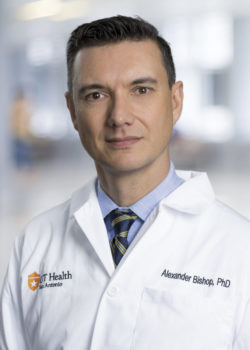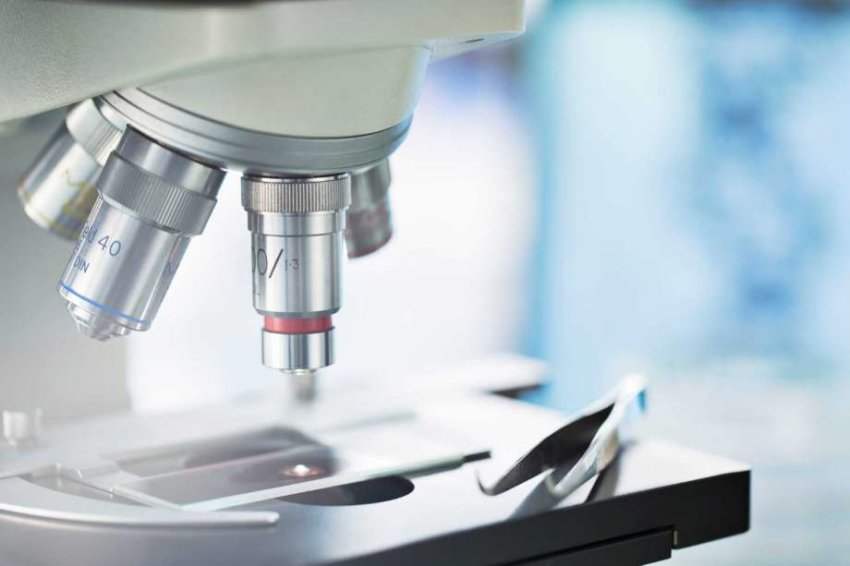New insights into Ewing sarcoma, an aggressive childhood cancer, were published July 15 in the prestigious journal Nature. Researchers from the Long School of Medicine at The University of Texas Health Science Center at San Antonio contributed to the study.
Ewing sarcoma is a bone and soft tissue cancer that primarily affects children and adolescents. The discovery, made by scientists at the University of Toronto, relates to cell structures called nucleoli and a physical change they undergo called phase separation.
The Toronto team observed that to form normal nucleoli, a structure must be made in the DNA. This is accomplished by the delicate balance of two different, but opposing, genetic code-reading machines. If these systems are not in balance, nucleoli lose their form and break up into smaller entities, the team found.

Study author Alexander Bishop, DPhil, of UT Health San Antonio, with team members at the Greehey Children’s Cancer Research Institute, previously showed that one of the genetic code-reading machines is overactive in Ewing sarcoma. In the newly published study, they confirmed that, in Ewing sarcoma, this overactivity causes the nucleoli to break up into smaller entities.
“We are working now to better understand the impacts of this biology in Ewing sarcoma and how we can take advantage of it therapeutically,” Dr. Bishop said.
Dr. Bishop joined UT Health San Antonio in 2005. He is an associate professor in the Department of Cell Systems and Anatomy of the Long School of Medicine, is a researcher in the university’s Greehey Institute, and is a member of the Mays Cancer Center, home to UT Health San Antonio MD Anderson.
Funding for the UT Health San Antonio investigators is from the U.S. National Institutes of Health and the Cancer Prevention and Research Institute of Texas.
Nucleolar RNA polymerase II drives ribosome biogenesis
Karim Mekhail, Karan Abraham, Negin Khosraviani, Janet Chan, Aparna Gorthi, Anas Samman, Dorothy Zhao, Miling Wang, Michael Bokros, Elva Vidya, Lauren Ostrowski, Roxanne Oshidari, Violena Pietrobon, Parasvi Patel, Arash Algouneh, Rajat Singhania, Yupeng Liu, V Yerlici, Daniel de Carvalho, Michael Ohh, Brendan Dickson, Razq Hakem, Jack Greenblatt, Stephen Lee, Alexander Bishop
First published: July 15, 2020, Nature
https://doi.org/10.1038/s41586-020-2497-0
# # #
The Long School of Medicine at The University of Texas Health Science Center at San Antonio is named for Texas philanthropists Joe R. and Teresa Lozano Long. The school is the largest educator of physicians in South Texas, many of whom remain in San Antonio and the region to practice medicine. The school teaches more than 900 students and trains 800 residents each year. As a beacon of multicultural sensitivity, the school annually exceeds the national medical school average of Hispanic students enrolled. The school’s clinical practice is the largest multidisciplinary medical group in South Texas with 850 physicians in more than 100 specialties. The school has a highly productive research enterprise where world leaders in Alzheimer’s disease, diabetes, cancer, aging, heart disease, kidney disease and many other fields are translating molecular discoveries into new therapies. The Long School of Medicine is home to a National Cancer Institute-designated cancer center known for prolific clinical trials and drug development programs, as well as a world-renowned center for aging and related diseases.
The University of Texas Health Science Center at San Antonio, also referred to as UT Health San Antonio, is one of the country’s leading health sciences universities and is designated as a Hispanic-Serving Institution by the U.S. Department of Education. With missions of teaching, research, patient care and community engagement, its schools of medicine, nursing, dentistry, health professions and graduate biomedical sciences have graduated more than 37,000 alumni who are leading change, advancing their fields, and renewing hope for patients and their families throughout South Texas and the world. To learn about the many ways “We make lives better®,” visit www.uthscsa.edu.
Stay connected with The University of Texas Health Science Center at San Antonio on Facebook, Twitter, LinkedIn, Instagram and YouTube.


